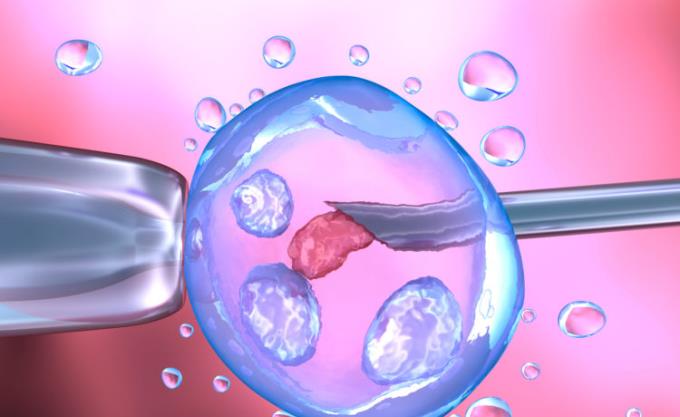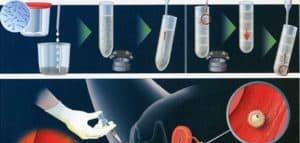Currently, there are many methods to support fertility treatment to help infertile couples, infertility, have a lovely little angel. Join aFamilyToday Health to learn about artificial insemination in the following article!
Do you have infertility and infertility problems and have been advised by your doctor about the method of in vitro fertilization? Unlike in vitro fertilization, artificial insemination is a method of fertility treatment in the form of injecting sperm directly into a woman's uterus.
What is artificial insemination?

Artificial insemination is a fertility treatment to help infertile couples have a baby.
In this method, the doctor injects sperm directly into the woman's uterus to increase the chances of successful conception. The mucus that surrounds the cervix can prevent sperm from swimming into the uterus or fallopian tubes. Thanks to the method of artificial insemination, the sperm can completely penetrate the uterus. Therefore, artificial insemination is also known as intrauterine insemination (IUI).
The most common reason couples choose to inseminate is closely related to the quality of their husband's sperm . Low sperm count or poor sperm motility are the reasons why you cannot conceive naturally. Another reason to mention is that your husband has ejaculation disorder or your husband and wife are infertile for unknown reasons.
Who is the method of artificial insemination applicable to?
1. Who can perform artificial insemination?
You may have to resort to artificial insemination when it is difficult to conceive with normal sex or find it difficult to have vaginal sex, for example you or your husband has a physical disability or have problems with psychosexuality.
In addition, you will be advised to use this method of fertility support if you encounter the following situations:
You have endometriosis or have genital abnormalities;
Your husband has HIV , sexually transmitted diseases or erectile dysfunction
1 year after unsuccessful attempts to become pregnant for women younger than 35 years, or 6 months for women over 35 years ( Healthline ).
You have an allergic reaction to certain proteins found in sperm
Sometimes your husband may not be able to produce the required amount of sperm for successful fertilization or the sperm is not able to move well to reach the egg
You or your husband have applied certain medical treatments that increase your risk of infertility, such as radiation therapy.
2. Who cannot perform artificial insemination?
You will be advised by your doctor to use other methods of fertility such as in vitro fertilization or ask a pregnant woman to help you if you have one of the following conditions:
Fallopian tube blockage or serious fallopian tube abnormality;
Have a history of pelvic infection;
Endometriosis is moderate to severe.
How is artificial insemination (IUI) done?
Diagnostic tests before implementation
Before performing artificial insemination, your husband and wife will be assigned to a number of tests to determine the cause of infertility and infertility. From there, the doctor will evaluate whether this method is suitable for your husband and wife's location or not.
For women, if you want to use this method of fertility, your tubes are not clogged and completely normal. This is because the oviduct is where the sperm fertilize the egg and form an embryo that moves to the uterus .
Your doctor will use one of the following three methods to check your fallopian tubes and evaluate the situation:
Laparoscopy;
X-ray of the ovaries with contrast;
Ultrasound of the uterus - vaginal tubes with HyCoSy contrast.
Methods of artificial insemination

1. Inseminate artificially at the time of ovulation to increase fertility
To maximize your chances of success, artificial insemination will be performed immediately after ovulation. Most women ovulate about 12-16 days after the first day of their last menstrual period. This number may vary in women with irregular menstrual cycles.
You can also use the fertility day prediction (OPK) kit to calculate ovulation days with relative accuracy. OPKs can measure the amount of hormone released in your urine or saliva when you are ovulating. In addition, your doctor may give you a blood test to determine when you ovulate.
Your doctor will likely use ovulation stimulants to help speed up the waiting time. In many cases, your doctor will use the transvaginal ultrasound method to be able to monitor the growth of the egg. Once the egg matures, you'll be injected with a hormone to stimulate ovulation.
2. Artificial insemination using the husband's sperm
The husband will be asked to provide semen at the hospital clinic by masturbation. The semen sample is then screened through a special device to remove all weak or dead sperm. This process is to select the healthiest sperm to increase your chances of conceiving.
The technologist will use a medical instrument called a speculum to open your vagina and then place a small, flexible catheter called a catheter into the vagina. The catheter is meant to create a pathway into your uterus and maximize the number of sperm cells placed in the uterus. This process is usually less painful, but some people will experience mild cramps. The sperm is then pumped through a catheter into the uterus.
With only about 10 minutes of procedure and about 30 minutes of rest, you and your husband can go home after the procedure is done.
3. Obtain donated sperm for artificial insemination
If your husband's sperm is not healthy or you are not married but want to have a baby, you can still use donated sperm. A sperm donor can be someone you know or you can buy sperm from a sperm bank.
All donated sperm samples will be tested for infections such as HIV , hepatitis B , hepatitis C and other genetic disorders such as sickle cell anemia and disease. Cystic fibrosis.
The Sperm Bank will provide information about the donor's physiological features such as race, hair color, eye color ... This will help couples to choose a donor who has the same characteristics as what they want.
If you use donated sperm, the sperm will be thawed before your doctor can start artificial insemination.
Success rate of artificial insemination

The rate of a successful pregnancy with artificial insemination depends on many factors such as the woman's age, the number and quality of the sperm (using new sperm will increase the chances of conceiving more than using frozen sperm. ).
In addition, the successful conception rate is also affected by the correct technology and calculation of ovulation time. But the most influential factor is the age of the woman. A study of 2,019 cases of artificial insemination has shown that:
From 20 to 30 years old: pregnancy rate is 17.6%, birth rate is 13%
From 31 - 35 years old: pregnancy rate is 13.3%, birth rate is 10%
From 36 - 38 years old: pregnancy rate is 13.4%, birth rate is 9%
From 39-40 years old: the pregnancy rate is 10.6%, the birth rate is 7%
Over the age of 40: The pregnancy rate is 5.4%, the birth rate is 3%.
Thus, if you are over 40, the pregnancy and birth rate is very low. Therefore, obstetricians often advise you to apply in vitro fertilization to increase your chances of success.
What should you do after artificial insemination?
Although there is no need for bed rest, you should limit your movement or maintain a healthy diet after IUI. However, if you feel you need to rest or feel uncomfortable after the IUI procedure, you can take a few days off.
You can still have sex right after the IUI procedure. In fact, this also aids in artificial insemination and yields positive results.
However, in the event of bleeding during the procedure, you should not have sex for 2 days after fertilization.
Even if you experience pain or cramping after the procedure, you should avoid taking any NSAIDs or pain relievers like ibuprofen. Instead, consult with an obstetrician so they can prescribe other medications such as acetaminophen or buscopan.
To aid in embryo transplantation, the doctor can supplement hormones. This can be taken by mouth or placed in the vagina as a suppository.
While there is no evidence that swimming interferes with the IUI procedure, it is best to avoid swimming for about 48 hours after the IUI procedure.
If you are on hormonal medications, ask your doctor if you should continue swimming.
How many times have artificial insemination become pregnant?
The results of the IUI assisted reproductive method vary from case to case. There are a few couples who are successful from the first time, but there are many couples that have to go through many times to conceive. In addition, there are also couples that never succeed.
Your doctor will recommend that you try this method at least 3–6 times, in parallel with the hormone injection before deciding to pursue other treatments. If that doesn't work, you can try in vitro fertilization (IVF) with your own or a donated egg.
Complications can be encountered with artificial insemination

Artificial insemination carries the risk of complications such as infection for women. Many studies have shown that less than 1% of infections are caused by this method.
Women who undergo artificial insemination can experience minor vaginal injuries since the procedure of inserting the catheter into the uterus can cause vaginal bleeding, but this usually does not affect your chances of conceiving.
Usually, artificial insemination will not increase the risk of multiple pregnancies . But if your doctor gives you an egg stimulant, the risk of multiple pregnancies will increase significantly. If the pregnant mother does not have enough health conditions, being pregnant with multiple pregnancies will be quite dangerous because the baby may be born prematurely , underweight and the mother will be under pressure from health.
It is a common belief that artificial insemination or fertility drugs can increase the risk of birth defects in the fetus. However, according to the American Society of Reproductive Medicine , this is a misconception. In fact, the chance of having a birth defect in an unborn baby is about 2 - 4% whether you're pregnant naturally or undergoing artificial insemination.
Costs for performing artificial insemination
The cost of this type of service depends on the hospital, private hospitals usually have higher fees than public hospitals. The cost of implementing this method at Tu Du Obstetrics Hospital is about 10 million VND. Meanwhile, in private hospitals, this fee will be higher. Therefore, you should consult the rates for this method of fertility support from different hospitals before choosing which hospital to perform this method.
You should consider both the cost of taking hormones and drugs to use, as well as the cost of sperm screening to prepare the most appropriate financial. If you use donor sperm, you may incur additional costs.
Where is the best place for artificial insemination?

Artificial insemination in the best hospital is the question of many infertile couples, infertility. The cost of implementation and the effectiveness of the assisted reproduction methods are the deciding factor.
Currently, in our country there are many hospitals that carry out assisted reproduction by this method. But you should go to major hospitals or centers such as Tu Du Obstetrics Hospital, Hung Vuong Obstetrics Hospital, Mekong Obstetrics Hospital, Central Maternity Hospital, Hue Central Hospital, Military Hospital y 103… to do this technique. The reason is that these units have full modern equipment and a team of highly skilled doctors will help the successful pregnancy rate higher.
Does artificial insemination help you have the desired baby?
With the advancement of medicine, the desired birth of a baby is entirely possible by sperm screening. However, due to ethical reasons, currently in our country and many countries around the world do not allow this form to select the sex of the fetus. Therefore, the sperm screening method is mainly used to eliminate weak sperm.
Hopefully, with the above information, you will have more useful knowledge about artificial insemination. Wish you and your family have good news soon!
















